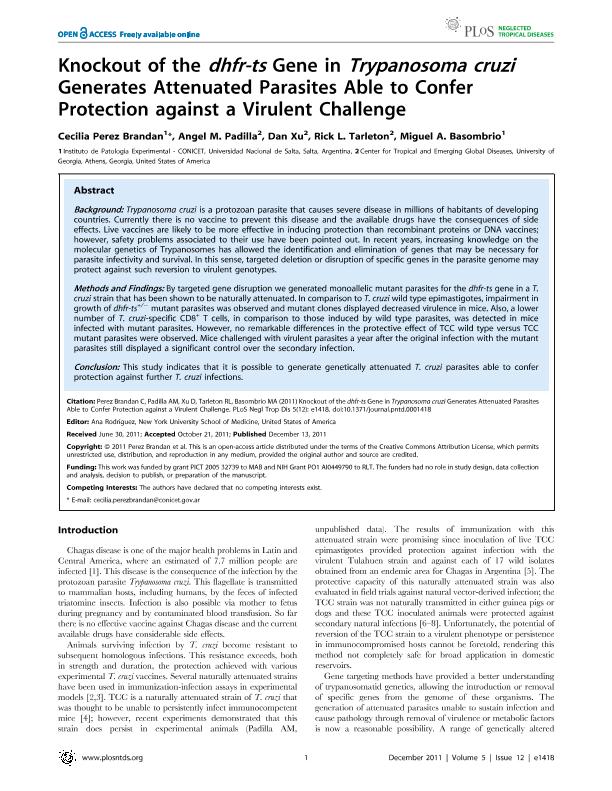Artículo
Knockout of the dhfr-ts Gene in Trypanosoma cruzi Generates Attenuated Parasites Able to Confer Protection Against a Virulent Challenge
Perez Brandan, Cecilia Maria ; Padilla, Ángel M.; Xu, Dan; Tarleton, Rick L.; Basombrio, Miguel Angel Manuel
; Padilla, Ángel M.; Xu, Dan; Tarleton, Rick L.; Basombrio, Miguel Angel Manuel
 ; Padilla, Ángel M.; Xu, Dan; Tarleton, Rick L.; Basombrio, Miguel Angel Manuel
; Padilla, Ángel M.; Xu, Dan; Tarleton, Rick L.; Basombrio, Miguel Angel Manuel
Fecha de publicación:
13/12/2011
Editorial:
Public Library Of Science
Revista:
Neglected Tropical Diseases
ISSN:
1935-2735
Idioma:
Inglés
Tipo de recurso:
Artículo publicado
Clasificación temática:
Resumen
Background: Trypanosoma cruzi is a protozoan parasite that causes severe disease in millions of habitants of developing countries. Currently there is no vaccine to prevent this disease and the available drugs have the consequences of side effects. Live vaccines are likely to be more effective in inducing protection than recombinant proteins or DNA vaccines; however, safety problems associated to their use have been pointed out. In recent years, increasing knowledge on the molecular genetics of Trypanosomes has allowed the identification and elimination of genes that may be necessary for parasite infectivity and survival. In this sense, targeted deletion or disruption of specific genes in the parasite genome may protect against such reversion to virulent genotypes. Methods and Findings: By targeted gene disruption we generated monoallelic mutant parasites for the dhfr-ts gene in a T. cruzi strain that has been shown to be naturally attenuated. In comparison to T. cruzi wild type epimastigotes, impairment in growth of dhfr-ts+/2 mutant parasites was observed and mutant clones displayed decreased virulence in mice. Also, a lower number of T. cruzi-specific CD8+ T cells, in comparison to those induced by wild type parasites, was detected in mice infected with mutant parasites. However, no remarkable differences in the protective effect of TCC wild type versus TCC mutant parasites were observed. Mice challenged with virulent parasites a year after the original infection with the mutant parasites still displayed a significant control over the secondary infection. Conclusion: This study indicates that it is possible to generate genetically attenuated T. cruzi parasites able to confer protection against further T. cruzi infections.
Palabras clave:
Trypanosoma Cruzi
,
Dhfr-Ts
,
Vaccines
Archivos asociados
Licencia
Identificadores
Colecciones
Articulos(IPE)
Articulos de INST.DE PATOLOGIA EXPERIMENTAL
Articulos de INST.DE PATOLOGIA EXPERIMENTAL
Citación
Perez Brandan, Cecilia Maria; Padilla, Ángel M.; Xu, Dan; Tarleton, Rick L.; Basombrio, Miguel Angel Manuel; Knockout of the dhfr-ts Gene in Trypanosoma cruzi Generates Attenuated Parasites Able to Confer Protection Against a Virulent Challenge; Public Library Of Science; Neglected Tropical Diseases; 5; 12; 13-12-2011; 1-10;e1418
Compartir
Altmétricas



